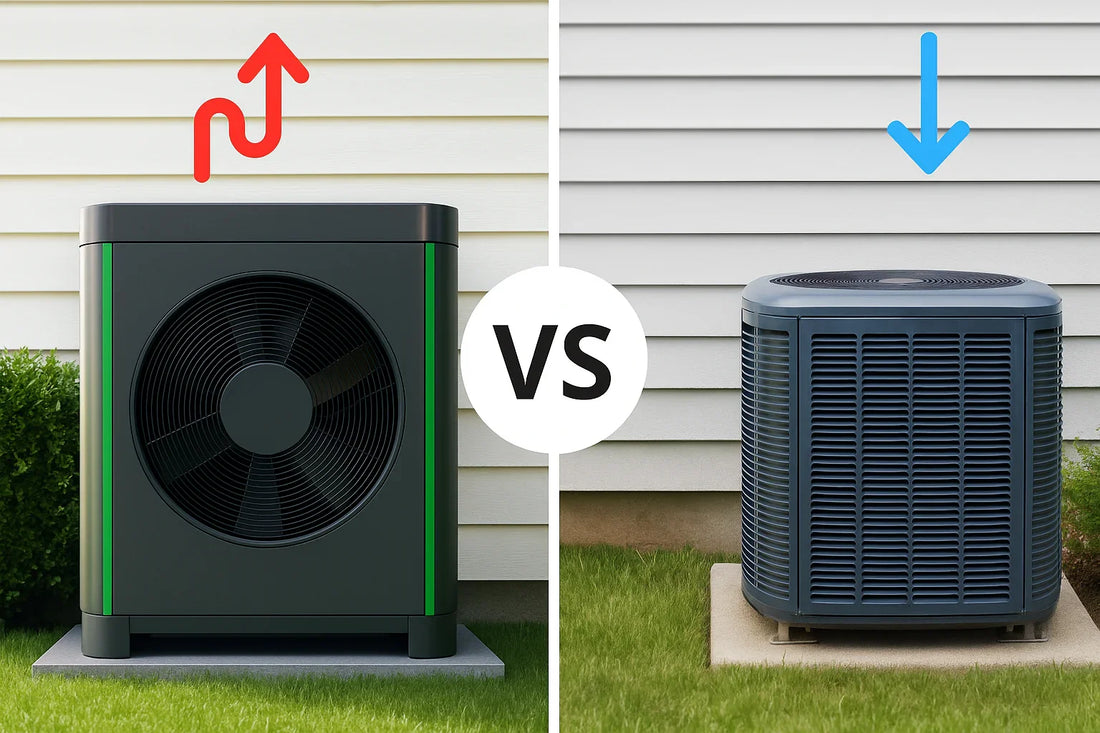
Heat Pump vs AC: Which is Best? | Central Air Guide
Share
Heat Pump vs AC: Which System Is Right for Your Home?
In the realm of home climate control, choosing the right system to heat and cool your home is essential for comfort and energy efficiency. Whether you're in the market for a conventional air conditioner or exploring the benefits of a heat pump system, understanding the intricacies of these systems is crucial. This guide aims to demystify the differences between a heat pump and an air conditioner, providing a comprehensive overview of their functions, efficiency, and cost implications. As you navigate the options, consider how each system's energy consumption, initial cost, and capability to heat and cool could impact your home environment and energy bills.
Understanding Air Conditioning Systems
The heart of any HVAC system is the air conditioning unit, a vital component in maintaining indoor comfort. An air conditioner functions by removing heat and humidity from indoor air, creating a cooler and more pleasant atmosphere. This process involves a series of components working together to efficiently regulate the indoor temperature. Regardless of whether you opt for a central air conditioner or another type of AC unit, the fundamental operation remains the same, focusing on transferring heat from the air inside to the outside, ensuring a consistently cool environment in your home.
What is an Air Conditioner?
At its core, an air conditioning system is designed to cool your home by extracting heat from the indoor air and releasing it outside. This is achieved through a network of components including a compressor, condenser, and evaporator, which together facilitate the efficient removal of heat. While different designs of air conditioners exist, from traditional air conditioners to compact window units, the primary function of each is to regulate temperature and humidity by altering the state of a refrigerant to absorb and release heat. This process not only provides a cooling effect but also enhances indoor air quality by reducing humidity levels.
How Central AC Works
Central air conditioning systems operate by regulating both temperature and humidity levels within indoor spaces. This process involves several components and stages:
| Component | Function |
|---|---|
| Compressor | Increases the pressure and temperature of the refrigerant. |
| Condenser Coil | Releases absorbed heat to the outside air, transitioning refrigerant into a liquid state. |
| Evaporator Coil | Evaporates refrigerant and absorbs heat from indoor air. |
| Fan | Circulates cooled air throughout the space. |
The refrigerant, now a gas again, returns to the compressor to repeat the cycle. Central air conditioning is distinguished by its ability to maintain a consistent indoor climate through a system of ducts and registers that distribute cool air efficiently.
Types of AC Units
There are several types of AC units available, each suited to different cooling needs and installation scenarios.
| Type of AC Unit | Features |
|---|---|
| Central Air Conditioning Systems | Use a network of ducts to deliver cool air throughout an entire home; ideal for comprehensive climate control in larger spaces. |
| Window Air Conditioners and Portable AC Units | Designed to cool smaller areas, such as individual rooms or specific zones within a home. |
Each type of AC unit has its own set of pros and cons, from the energy efficiency and installation cost to the level of control over the indoor environment they provide. Choosing the right type hinges on factors like the size of the area you wish to cool and your specific heating and cooling needs.
Heat Pump vs Air Conditioner: Key Differences
What is a Heat Pump?
Heat pumps are versatile components of an HVAC system designed to heat and cool your home by transferring heat from one area to another. Unlike traditional air conditioners that generate cold air, heat pumps work by extracting heat from the air or ground. During colder months, air-source heat pumps absorb heat from the outside air and transfer it indoors, effectively warming your space. In warmer months, the process reverses, and the heat pump expels indoor heat to cool your home. A heat pump system consists of an outdoor unit and an indoor air handler connected by refrigerant lines. The system uses a compressor to circulate refrigerant, which heats or cools the air. If temperatures fall below 30 degrees, additional heat strips may be employed to provide necessary warmth.
Difference Between Heat Pumps and AC Systems
The primary distinction between a heat pump and an air conditioning system lies in their functionality.
| Feature | Heat Pump | Air Conditioning System |
|---|---|---|
| Functionality | Can both heat and cool your home | Focuses solely on cooling |
| Heating System | Eliminates the need for a separate heating system as it operates on electricity | Relies on a separate heating system, like a furnace fueled by natural gas or heating oil |
Essentially, while an air conditioner removes heat from indoor air and expels it outside, a heat pump offers a reversible process that adjusts to seasonal demands.
Heat Pump vs AC: Energy Efficiency
When comparing the energy efficiency of a heat pump vs an AC system, heat pumps generally hold an advantage. Heat pumps transfer heat instead of generating it, leading to lower energy consumption and potentially reduced operational costs. According to the U.S. Department of Energy, high-efficiency heat pumps also excel in dehumidifying, which can result in less energy usage than central AC units. In moderate climates, heat pump systems offer efficient heating with electricity, bypassing the need for gas heating solutions. However, as temperatures drop below freezing, heat pumps require more energy to maintain indoor comfort, potentially decreasing efficiency and increasing electricity bills. Nonetheless, in warmer regions, the energy savings of a heat pump can be significant.
Pros and Cons of Each System
Pros and Cons of Heat Pumps
Heat pumps offer a distinct advantage over traditional air conditioners due to their ability to both heat and cool your home efficiently. One of the primary benefits of heat pumps is their superior energy efficiency. By extracting heat from the air and transferring it, they consume less energy compared to systems that generate heat. Additionally, heat pumps generally dehumidify the air better than standard AC units, which can lead to lower energy consumption. However, in colder climates, their efficiency decreases as more energy is required to heat your home. The initial cost of a heat pump system can be higher due to its dual functionality, but this investment is often offset by long-term energy savings, particularly in regions with moderate climates.
Pros and Cons of Air Conditioners
Air conditioners are a popular choice for cooling due to their straightforward design and lower upfront installation costs compared to heat pumps. Central air conditioners efficiently cool large spaces by removing heat and circulating cool air, making them ideal for homes in predominantly warm climates. However, they focus solely on cooling, necessitating a separate heating system, such as a furnace, during colder months. An AC system may result in higher energy bills since it doesn't transfer heat but instead removes it, often leading to increased energy consumption. Despite these drawbacks, air conditioning systems provide reliable cooling and are typically less expensive to install initially, making them a viable option for many homeowners.
Cost Considerations: Heat Pump vs AC
When evaluating the cost of a heat pump versus an air conditioner, several factors must be considered. Heat pumps typically have a higher initial cost due to their capability to both heat and cool, which involves more complex technology. This investment, however, often results in significant energy savings, particularly in climates where the temperature differential is moderate. Air conditioners, in contrast, come with a lower upfront cost but can lead to higher utility bills due to greater energy use. Furthermore, in homes with air conditioning, a supplementary heating system, such as a furnace, is necessary during colder months. Overall, while heat pumps represent an all-in-one solution with potential energy efficiency benefits, the choice between a heat pump and an air conditioner ultimately depends on specific climate and heating and cooling needs.
Choosing the Right Cooling System for Your Home
Factors to Consider When Choosing
When deciding between a heat pump and an air conditioner, various factors must be carefully evaluated to ensure the system aligns with your home’s heating and cooling needs. A significant consideration is the climate; in moderate climates, heat pumps provide an efficient solution for both cooling and heating, efficiently managing energy consumption. However, in regions with extreme temperatures, a central air conditioning system with a separate heating system, such as a furnace, might be more effective. Larger homes may benefit from the zoning capabilities of heat pumps, allowing for tailored temperature control in different areas. If your primary focus is on reducing fossil fuel reliance, enhancing energy efficiency, and lowering utility bills over time, a heat pump system could be the most advantageous choice.
Heat Pump or Air Conditioner: Which is Right for You?
The decision between a heat pump and an air conditioner hinges on several critical factors. In hot climates where heating is unnecessary, an air conditioner might be the more suitable option. Conversely, in regions requiring heating, a heat pump is advantageous due to its ability to extract heat from the air to warm your home efficiently. This capability makes heat pumps an energy-efficient and cost-effective choice for homes needing both heating and cooling solutions. The heat pump vs air conditioner debate ultimately depends on your specific climate and energy needs, as well as the long-term goals for energy efficiency in your home.
Long-term Benefits of Each System
For homeowners planning to stay in their homes for the long term, each system offers distinct advantages. Heat pumps often provide superior value through energy savings, particularly in areas with mild heating and cooling needs. Their ability to both heat and cool your home using electricity can lead to significant reductions in energy consumption and lower utility bills. On the other hand, central air conditioning systems provide reliable cooling, making them a preferred choice in regions with hot summers. Although the initial cost of a heat pump can be higher, the long-term benefits of energy efficiency and reduced reliance on fossil fuels often outweigh the upfront expenses, especially in moderate climates.
